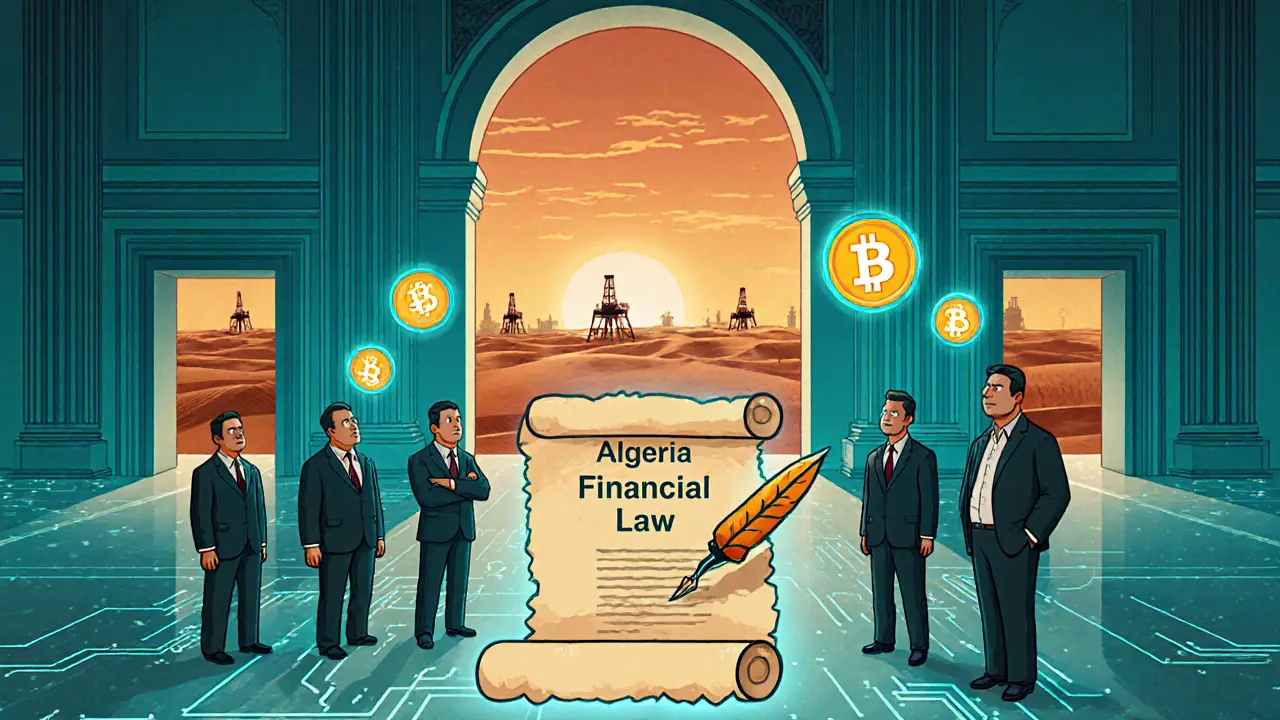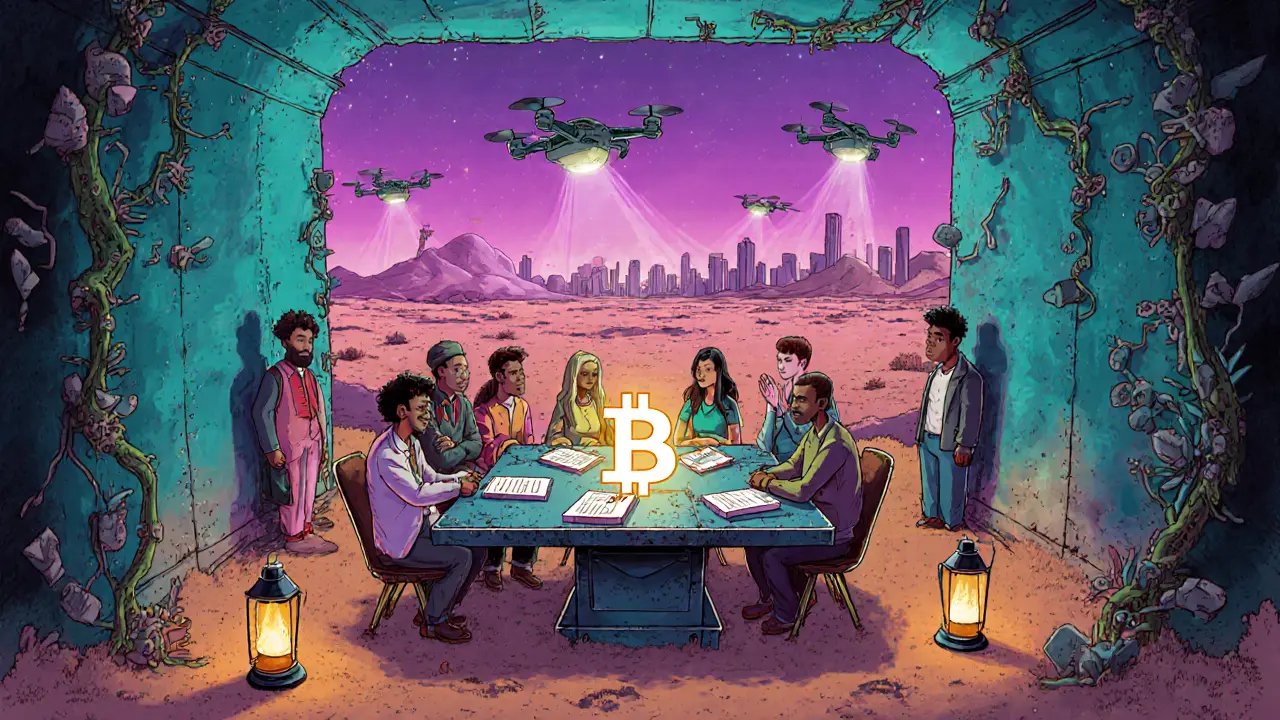Algeria Crypto Ban: From 2018 Financial Law to 2025 Full Prohibition
 Apr, 28 2025
Apr, 28 2025
Algeria Crypto Penalty Calculator
Crypto Activity Penalty Calculator
Select the crypto activity to see maximum penalties under Algeria's 2025 Law No. 25-10
Penalty Results
Maximum Prison Sentence
Maximum Fine
Important: These are maximum penalties under Law No. 25-10. Actual sentences may vary based on individual circumstances and judicial discretion.
Algeria cryptocurrency ban is a total prohibition on digital assets that started with the 2018 Financial Law and culminated in the 2025 Law No. 25-10. If you’ve been following the crypto scene in North Africa, you know the country went from a vague warning to a full‑blown criminal ban in just a few years. This article breaks down what the laws actually say, how they are enforced, and why the government took such a hard line.
What the 2018 Financial Law actually said
The first crack came in Financial Law of 2018 which introduced a blanket prohibition on buying, selling or using virtual currencies. The wording was simple: “cryptocurrencies are not legal tender.” But the law stopped short of defining penalties or giving agencies clear powers to act. That gray zone let a small community of Algerians keep trading on offshore platforms, especially when inflation made the dinar lose value.
- Prohibited activities: purchase, sale, use as payment.
- No clear fines or jail terms.
- Enforcement was left to the Bank of Algeria and the Banking Commission, but they never issued detailed guidelines.
Because the law was vague, many Algerians treated crypto like any other offshore investment, hoping the government would look the other way.
Why the 2025 crackdown was inevitable
Fast forward to July 24, 2025: the parliament passed Law No. 25-10 a sweeping criminal ban on all crypto‑related activities. The new text does not just ban trading - it criminalises possession, promotion, mining, even talking about crypto online.
Key motivations behind the shift include:
- Protecting the Algerian dinar as the sole legal tender and preventing capital flight.
- Aligning with FATF guidelines on anti‑money‑laundering and counter‑terrorist financing.
- Limiting energy consumption from crypto mining, a big concern given Algeria’s subsidised power grid.
What exactly is now illegal?
Law No. 25-10 lists dozens of prohibited actions. Here’s a quick rundown:
- Creating or issuing any token or coin.
- Buying, selling, or swapping crypto on any exchange.
- Holding crypto in a wallet, even a few satoshis.
- Using crypto as a payment method for goods or services.
- Running a crypto exchange or providing liquidity.
- Mining or staking activities.
- Advertising, educating, or producing content that mentions crypto investment.
Even influencers who simply post a “buy Bitcoin now” tweet can be charged.
Penalties that the law imposes
Violations are treated as criminal offenses. The punishments range from two months to one year in prison, plus hefty fines:
| Offense | Maximum Prison | Fine (Algerian Dinars) |
|---|---|---|
| Possession of any crypto | 1 year | 1,000,000 DZD |
| Operating an exchange | 1 year | 1,000,000 DZD |
| Advertising or promotion | 6 months | 700,000 DZD |
| Mining activities | 6 months | 500,000 DZD |
In USD terms, the fines sit between $1,540 and $7,700 - some of the harshest crypto penalties worldwide.

How Algeria’s stance compares globally
| Country | Regulatory Model | Key Features |
|---|---|---|
| Algeria | Full prohibition | Criminalises possession, mining, promotion |
| United Arab Emirates | Permissive framework | Licensed exchanges, crypto‑friendly zones |
| Bahrain | Regulated market | Clear AML/KYC rules, crypto‑asset sandbox |
| United States | Hybrid | SEC oversight, state‑level licences, no blanket ban |
| European Union | MiCA (upcoming) | Standardised rules, consumer protection |
| China | Restricted with limited pilot zones | Ban on mining, limited exchange licences |
While most of the world is moving toward regulated adoption, Algeria is stuck in the “no‑go” lane. The only comparable country with a similar level of strictness is China, but even China continues to allow some state‑approved activities.
Who enforces the ban and how?
Enforcement is a joint effort:
- Bank of Algeria monitors the banking system for any crypto‑linked transactions.
- Banking Commission ensures that licensed banks do not facilitate crypto.
- Judicial authorities prosecute offenders and hand down sentences.
- Security agencies conduct digital surveillance, targeting online forums, social media, and even mining farms.
Because the law covers “information sharing,” authorities have started raiding internet cafes and shutting down Telegram groups that discuss crypto.
Impact on Algerian users and the local ecosystem
Before 2025, a modest but active crypto community existed. People used Bitcoin and other coins to hedge against inflation and to send money abroad when official channels were costly.
Now the community faces a legal wall:
- Individuals risk jail for holding even a fraction of a coin.
- Businesses can no longer accept crypto payments.
- Content creators risk fines for any crypto‑related tutorial.
- Potential investors abroad are discouraged from partnering with Algerian firms.
Many have either moved their assets offshore or stopped crypto altogether. The ban also stifles any local blockchain innovation - from supply‑chain pilots to fintech apps that could have used smart contracts.

What does the future look like?
Algeria’s hardline approach may become harder to sustain. Global finance is increasingly integrating crypto‑based solutions - think cross‑border payments, decentralized finance, and tokenised assets. As neighbouring countries like the UAE attract crypto‑friendly investment, Algeria risks falling behind in digital innovation.
Enforcement challenges are real. Policing private wallets, especially those stored on hardware devices, is technically demanding. Moreover, the ban conflicts with digital‑rights advocates who argue that merely discussing technology should not be criminalised.
Unless the government decides to soften the law, the country may see a growing underground market, similar to what happened with other prohibited substances. That underground activity could bring the very money‑laundering and terror‑financing risks the law aims to prevent.
Key takeaways
- The 2018 Financial Law introduced a vague crypto ban; the 2025 Law No. 25-10 turned it into a strict criminal prohibition.
- All crypto‑related activities - from owning a single coin to posting a meme - are punishable by up to one year in prison and fines up to 1,000,000 DZD.
- Algeria’s stance is among the toughest globally, contrasting sharply with permissive regimes in the UAE, Bahrain, and the EU.
- Enforcement is coordinated across banking, security, and judicial bodies, making compliance risky for anyone in the ecosystem.
- Future prospects depend on whether the government will soften the law or continue to enforce a complete ban, which could push activity underground.
Frequently Asked Questions
Is it illegal to own a small amount of Bitcoin in Algeria?
Yes. Law No. 25-10 criminalises possession of any cryptocurrency, no matter how tiny the amount.
What penalties can I face for posting a crypto tutorial?
Promoting or educating about crypto is listed as a prohibited activity. You could be fined up to 700,000 DZD and face up to six months in prison.
How does the ban affect Algerian banks?
Banks must ensure no crypto transactions go through their systems. The Bank of Algeria conducts regular audits and can impose sanctions on non‑compliant institutions.
Can I still trade crypto on foreign exchanges?
Technically you could access foreign platforms, but if authorities detect the activity you risk prosecution under the 2025 law.
Will the ban affect non‑Algerian investors?
Indirectly, yes. Companies that want to do business in Algeria may avoid partnerships with firms that have any crypto exposure, limiting cross‑border investment opportunities.
Trent Mercer
October 23, 2025 AT 22:31Algeria’s just doubling down on being a digital dinosaur. I mean, banning *possession*? Like, you’re gonna jail someone for having 0.001 BTC in a hardware wallet? That’s not regulation-that’s performance art. Meanwhile, the UAE is building crypto skyscrapers and Algeria’s out here treating Bitcoin like contraband cocaine. The dinar’s sinking, sure-but outlawing innovation won’t fix monetary policy. It just makes the smart people leave.
Also, ‘talking about crypto online’ is illegal now? Next they’ll fine you for saying ‘blockchain’ at a dinner party. I’m not even mad-I’m just impressed at how creatively authoritarian they’ve gotten.
Meanwhile, my 82-year-old aunt in Ohio just bought her first ETH and she’s got more financial literacy than half the Algerian parliament.
Also, who’s auditing the central bank’s own digital reserves? But sure, let’s jail the散户.
At this point, I’m just waiting for the government to ban the word ‘decentralized.’
Kyle Waitkunas
October 24, 2025 AT 13:30THEY’RE USING THIS AS AN EXCUSE TO TRACK EVERY DIGITAL TRANSACTION!!!
Do you realize what this means?!?! They’re not banning crypto-they’re building a surveillance state under the guise of ‘anti-money laundering’!!!
Every time someone buys a coffee with dinars now, the Bank of Algeria is logging it, timestamping it, correlating it with IP addresses, and linking it to their phone’s GPS!!!
And the ‘crypto mining’ ban? HA! That’s just to shut down the decentralized power grids they can’t control!!!
They’re terrified of peer-to-peer value transfer because if people can bypass the state’s financial chokehold, they’ll realize the dinar is a paper illusion!!!
And don’t get me started on the Telegram raids!!! They’re not shutting down groups-they’re hunting for dissenters!!!
Mark my words: next they’ll ban VPNs, then private messaging apps, then… then… the right to think independently!!!
It’s happening right now, and no one’s talking about it!!!
THEY’RE TURNING ALGERIA INTO A DIGITAL PRISON-AND WE’RE ALL BEING WATCHED!!!
WHY ISN’T THE MEDIA REPORTING THIS?!?!?!
Someone needs to leak the internal documents!!! I’ll start a GoFundMe!!!
THEY’RE COMING FOR US NEXT!!!
vonley smith
October 24, 2025 AT 16:30Man, I feel for the Algerian folks trying to do right by their families in a tough economy. Inflation’s brutal, remittances are expensive, and crypto was one of the few ways people could keep some value safe.
It’s not like they were running a hedge fund-they were just trying to feed their kids or send money home without getting gouged by banks.
And now? They’re being treated like criminals for using tech that’s global, not illegal by nature.
I get the government’s fears-capital flight, energy use, shadow markets-but punishing individuals who just want financial dignity? That’s not protection, that’s punishment.
Maybe instead of jail time, they could’ve tried education, pilot programs, or regulated wallets with limits.
There’s a middle ground. Always is.
Hope someone in power wakes up before this turns into a full-blown digital exodus.
And hey-if anyone’s got a friend in Algiers who needs help navigating this, I’ve got some contacts in fintech. Happy to help however I can.
Melodye Drake
October 25, 2025 AT 06:10It’s fascinating how people romanticize crypto as some kind of libertarian utopia when, in reality, it’s just a speculative casino built on hype, environmental waste, and anonymous money flows.
Algeria’s doing the responsible thing-protecting its currency, its citizens, and its energy resources from the chaos of unregulated digital gambling.
Let’s be honest: 99% of people who ‘invest’ in crypto don’t understand blockchain-they’re chasing memes and FOMO.
And now the government’s actually protecting them from themselves? Brilliant.
Yes, it’s extreme-but so is the behavior it’s trying to stop.
Imagine a mother using her life savings to buy Dogecoin because some influencer said it ‘mooned.’ That’s not freedom-that’s financial abuse.
And let’s not pretend this is about ‘digital rights.’ It’s about preventing predatory speculation from destabilizing a fragile economy.
China banned mining. Russia cracked down. Even India taxed it into submission.
Algeria? They’re just being the grown-ups in the room.
It’s not censorship. It’s care.
And honestly? I wish more countries had the courage to do the same.
paul boland
October 25, 2025 AT 17:48Algeria’s the only country with the balls to say NO to Western financial chaos!! 🤝💥
While the EU is busy letting billionaires turn meme coins into yachts, Algeria’s protecting its people from crypto scammers and IMF puppets!! 🚫💸
Anyone who says ‘it’s oppressive’ is just a crypto bro with a Coinbase account and zero respect for national sovereignty!!
Let them jail the degens!! Let them shut down the Telegram bots!! Let them ban Bitcoin tweets!!
WE NEED MORE COUNTRIES LIKE ALGERIA!!
Not ‘regulated’ crypto-NO CRYPTO!!
Algeria > UAE > USA > EU > EVERYONE ELSE!! 🇩🇿✊
1,000,000 DZD fine? Pfft. Should be 10x that!!
Long live the dinar!! Long live the ban!!
🚀🌕 #CryptoIsTerrorism #DinarOverDegen